Welcome back to our comprehensive guide on How To Be A Master Chef for beginners and food enthusiasts! In today’s posts, we’ll go over essential cookware & small appliances that will make your time in the kitchen easier and stress-free. If you’ve ever wanted to be a master chef, the time is now, so let’s get started!
Keep your kitchen safe with these tips on How to Create a Safe Kitchen for you and your family.
Purchase The Necessities
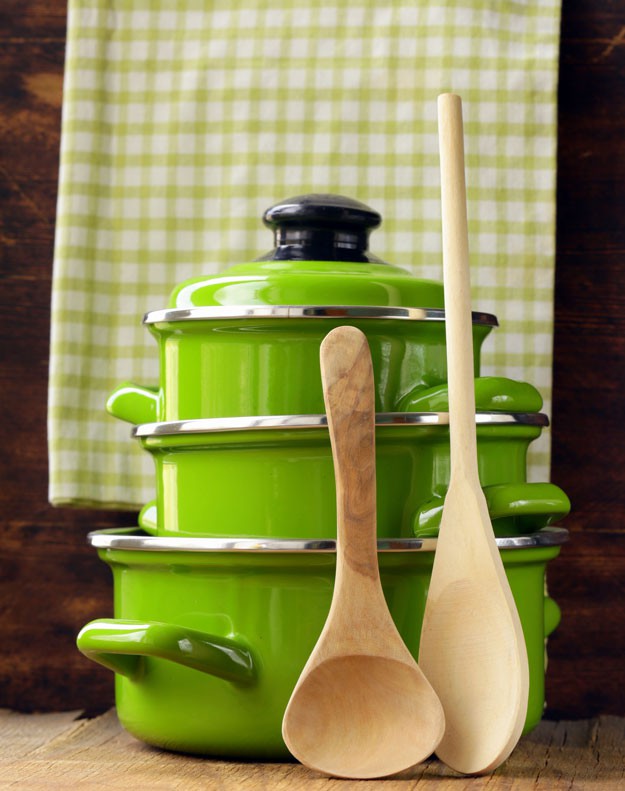
To start out, you don’t need to have the most expensive set of kitchen tools on the market; a basic set of tools will work just fine. We recommend that you get the basic tools you need and start from there. While these tools will not have the glamorous names and esthetics of the more expensive brands, you will be able to start cooking without breaking the bank. Also, once you learn to cook, you will be able to upgrade your tools to a set that better suits your needs. For now, you’ll be able to begin your culinary adventure and create phenomenal dishes with the basic tools we will discuss throughout this guide.
Finding Your Necessary Cookware
These are the basic cookware you will need to begin cooking without a hassle:
- Paring Knife: This knife is what you will use to peel, carve, and core
- 10-inch Chef’s Knife: Over 80 percent of your cutting and slicing will be done with this knife
- 9 to 12-inch Serrated Bread Knife: Well this one is quite obvious. You’ll be using this knife to cut fresh bread into slices to avoid crushing your loaves. You can also use this to slice other crushable foods (tomatoes, soft fruits).
- 10-inch Nonstick Skillet: This skillet will constantly be used for all of your frying or sauteing needs.
- 3-quart Saucepan: You’ll use this to cook your vegetables, soups, sauces, rice, and even small amounts of pasta.
- 10-quart Stockpot with Lid: This will be used when you are making your stocks, soups, vegetables, and pasta. You’ll be using this pot more than you think! Can you say… Family-style?!
- Liquid & Dry Measuring Cups & Measuring Spoons: Measurements are a huge part of cooking, and you’ll need these to get your measurements right!
- Heavy-Duty Roasting Pan: We wish you a Happy Thanksgiving and a happy New Year (that’s how the song goes, right?)! This will be used for the holidays most of the time (unless you feel like cooking up some turkeys and briskets year-round!). The high sides save all of the meaty and delicious juices for you to use in your gravy too!
- Meat Thermometer: This tool lets you know the temperature of your meat. Never guess again!
- Strainer: You’ll be loving this when it comes time to rinse your pasta, clean or drain lettuce, or strain your soups and sauces!
- Gravy Separator: Out pours the gravy while the other stuff (solid fats) stays on top of it.
- Vegetable Peeler, Wooden Spoons, & Heatproof Rubber Spatula: Don’t worry about the other gadgets in the kitchenware section. These are the bare necessities to get you cooking!
Pots & Pans: Which Ones Do I Really Need?
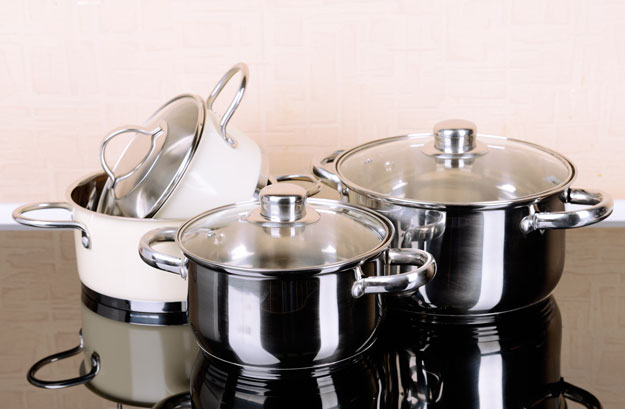
With all of the pots and pans that are out on the market, it only makes sense that there would be a lot of confusion when picking them out. You’ve probably seen aluminum pans with nonstick coating, expensive copper, cast iron coated with enamel, and heavy-duty stainless steel, but which one should you buy? As you cook, you’ll learn that each pot or pan has a different use.
Nonstick is always super easy, and we recommend using them as often as possible. With a nonstick coating, these pots and pans are great for cooking fat-free or low-fat meals. While these pans do not brown foods that well, they are easy to clean (a lifesaver in the kitchen!). The biggest issue with these pans is that if you scratch them up, they lose their nonstick qualities. To avoid this, we recommend that you use plastic or nylon utensils rather than metal ones.
Using nonstick aluminum is great for people who like lighter pans that are both durable and quick-heating. These are moderately cheap as well, making them perfect for people who are just starting to cook. While these do not last as long as other pans (2-3 years), they’re cheap to replace. If you are looking for something that will last longer, you should go with copper.
Copper has the best heat control in relation to other metals, making it the perfect cookware material when making sauces. There are also pots and pans made of stainless steel with copper or aluminum in between. If you are trying to save some money and purchase the quality that a copper pan has, you should check these out!
Pot & Pan Purchasing Tips
- Don’t just run out and buy the most expensive set! Just because pots and pans are priced higher than the rest does not mean they are the best!
- Hold the pan by its handle before you buy it. Make sure it is comfortable for you to use. Also, make sure the handle is heat resistant (if that is what you are looking for).
- Before buying a set of pots and pans, make sure you will use them. There is no reason to buy a whole set if you are not going to use all of them!
Bakeware Basics For Beginners
Baking without a pre-made mix means you are going to need a bunch of different pots, pans, spoons, whisks, spatulas, and bowls, but you may be able to get away with using some of your other cookware for baking. For example, your pots could double as a mixing bowl. Here are the tools that you will want to have prior to beginning your baking education:
- Mixing Bowls: These are used throughout the kitchen and honestly, they really will assist in making your life easier when combining ingredients. While you can always simply use a pot, stainless steel, ceramic, or glass mixing bowl will always come in handy. You can even buy them in a set!
- Spatulas: A heatproof rubber spatula assists in getting the last drop of batter out of your measuring cups or mixing bowls.
- Pastry Brush : This tool lets you glaze or coat your baked goods, giving them that beautifully browned finish. Coats of melted butter… Oh yes!
- Whisks : This tool will assist you in mixing up your batter and beating your eggs. You can put air into your mixture with it as well!
- Baking Sheet: Great for baking biscuits, bread, cookies, and more! Make sure it is nonstick to make cleaning a breeze. They come in many different sizes as well.
- Rolling Pin: You may need to roll something out when baking so this could be the difference between having perfectly flattened cookies and having lumpy, uneven blobs of dough!
- Cooling Racks: Your baked goods need to chill out! Get this tool to allow air to circulate around your masterpieces.
- Cake Pans: If you plan on baking cakes, make sure to get square and round cake pans (unless you’re a “square,” then just get the square cake pan). Pie pans, loaf pans, and muffin tins are also great to start out with!
- Flour Sifter: This assists in aerating the flour (for recipes that call for it). This ensures there will be no lumps in your baked deliciousness.
- Dry Measuring Cups: You’ll need dry cups to measure out ¼ cup, 1/3 cup, ½ cup, and 1 cup for most recipes.
- Liquid Measuring Cups: You have to have ¼ teaspoon, ½ teaspoon, 1 teaspoon, and 1 tablespoon measurements for a lot of recipes, meaning you should probably pick a set of these up!
Small Appliances Save Time & Energy
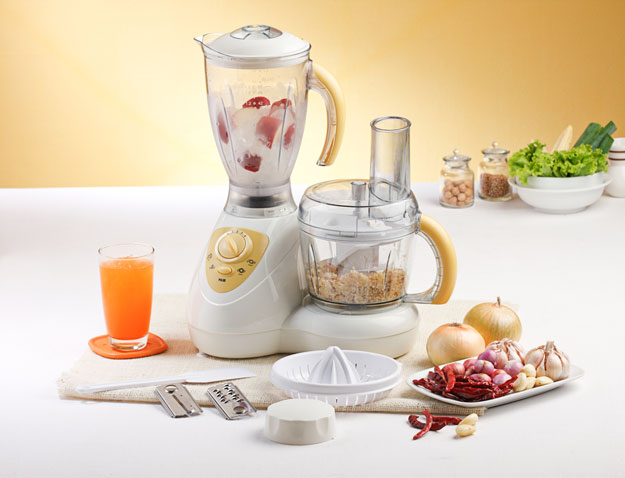
Why wouldn’t you want to save time and energy? With this list of small appliances, you will be ready for whatever the kitchen throws at you! Whether you need to mix, blend, chop or cut, we have you covered with our list of small appliances!
- Mixers, Blenders, & Beaters: You plan on making cakes, cookies, smoothies, milkshakes, and other stuff you’re going to have to mix, right? Well, don’t hesitate on making these purchases! Your arm is going to get super tired super fast if you have to mix a milkshake by hand!
- Slow Cooker/Crock Pot: Who doesn’t like a meal that has been stewing in its own juices for the day? This is a brilliant invention that allows you to set it and leave it. You’ll use this to cook chili, rice, chicken, ribs, vegetables, and stews!
- Food Processor: If you cook a lot, you’re going to love this! The steel blades gyrate super fast and chop up anything you put in it (within reason)! Grate cheese, chop nuts, herbs, veggies, tomatoes, carrots, celery, garlic, and anything else you can think of!
Other Kitchen Essentials
- Cheese Grater: Grate cheese like a pro!
- Potato Smasher: Not only used for potatoes! Smash anything your heart desires. We’ve seen people smash cauliflower, carrots, sweet potatoes, and more!
- Pepper Mill: Freshly ground pepper anyone? Give your meal an extra boost with a little-added spice!
- Salad Spinner: Who likes wet salad? Not us! Soggy salad is never a good thing.
- Vegetable Peeler: We like our veggies nude! Peel your veggies and put your garbage disposal to work!
Don’t miss the series; catch the rest of our guides below:
Chapter 1: Be A Master Chef in 10 Days
Chapter 2: Kitchen Storage Ideas
Chapter 2.1: Main Kitchen Appliances
Chapter 2.2: Creating a Safe and User-Friendly Kitchen
Chapter 2.3: Essential Pots, Pans and Cookware
Chapter 3: How To Organize and Stock Your Kitchen Pantry
Chapter 4: How To Buy and Use Your Kitchen Knives
Chapter 4.1: Knife Cuts – Chopping, Dicing and More
Chapter 5: How To Steam, Boil, Poach and More
Chapter 6: How To Saute and Make Homemade Sauces
Chapter 7: How To Braise Meat and How To Make Stew
Chapter 8: How To Roast Meat, Veggies and Poultry
Chapter 9: How To Grill Steak, Chicken and Veggies
Chapter 10: How To Bake Goods and Desserts From Scratch
Chapter 10.1: How to Make Pie Crust, How To Bake Cakes and More!
Chapter 11: Cooking for Beginners – Breakfast
Chapter 11.1: Breakfast Bread – How To Make French Toast, Pancakes & Waffles
Chapter 13: How To Cook Perfect Pasta and Hearty Grains
Chapter 14: How To Make Sauces From Scratch
Chapter 15: Easy To Make Homemade Desserts For Beginners
Chapter 16: How To Make Single-Pot Recipes From Scratch
Chapter 17: Thinking Like A Chef – Cooking Tips for Beginners
Don’t forget to catch the next part of our guide to How To Be A Master Chef In 10 Days! We love hearing your feedback and comments, so let us know if you have any other tips for beginner cooks or your thoughts on this series. HomemadeRecipes.com was founded to create an online community where foodies, epicureans and chefs can share recipes and learn new ones! We need your help, however, in creating this community where you can come, share and learn. If you love to cook, love food or have some great recipes and ideas you’d like to share with us, shoot us an email and make sure to stay in touch on Facebook, Twitter, and Pinterest! We’re always looking for contributors and want to hear from you.
Sign up for our daily newsletter here!
Do you have Instagram? Don’t forget to follow @HomemadeRecipesOfficial.
Click here to Like Us on Facebook.
Click here to Follow Homemade Recipes on Pinterest
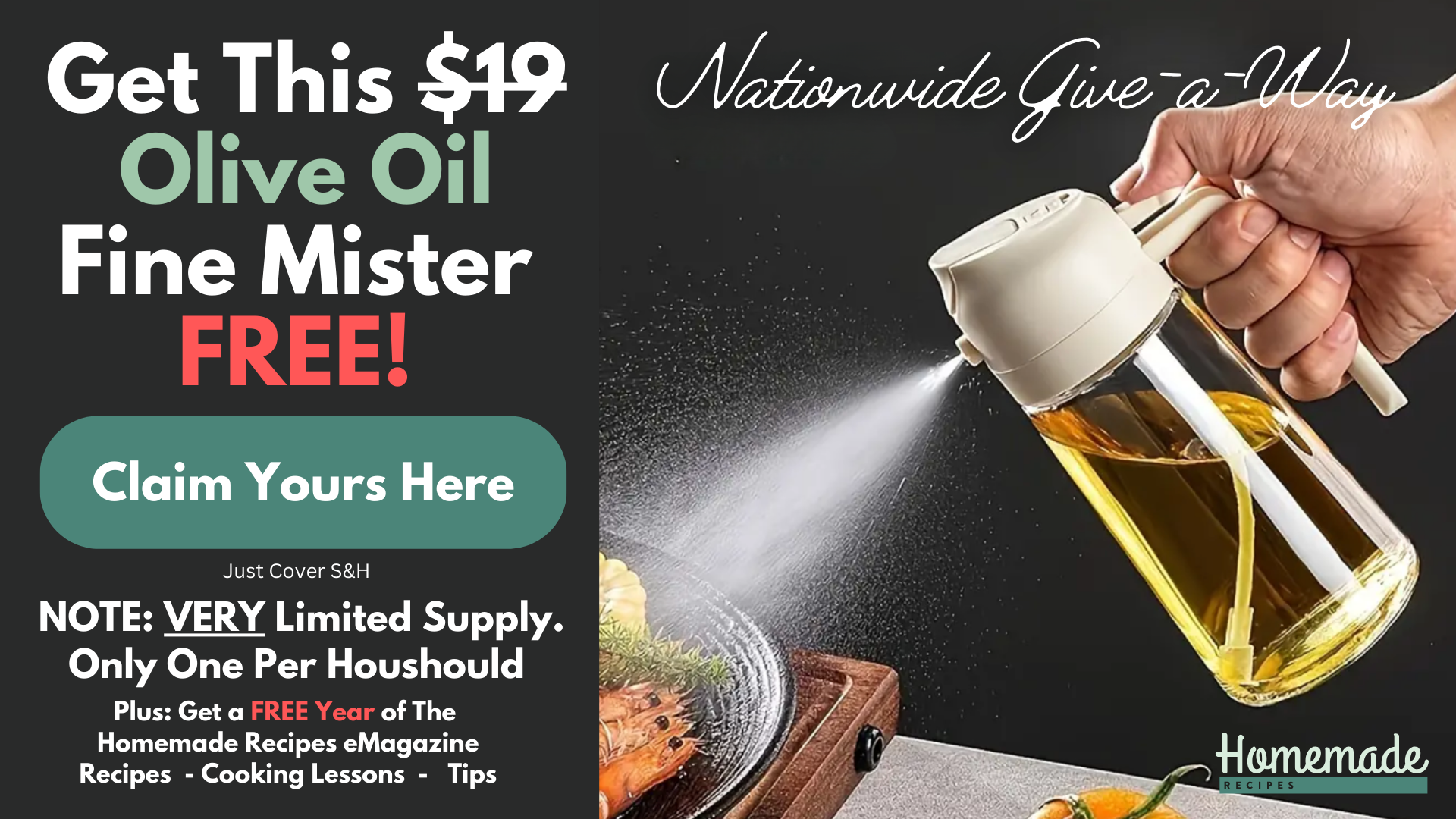
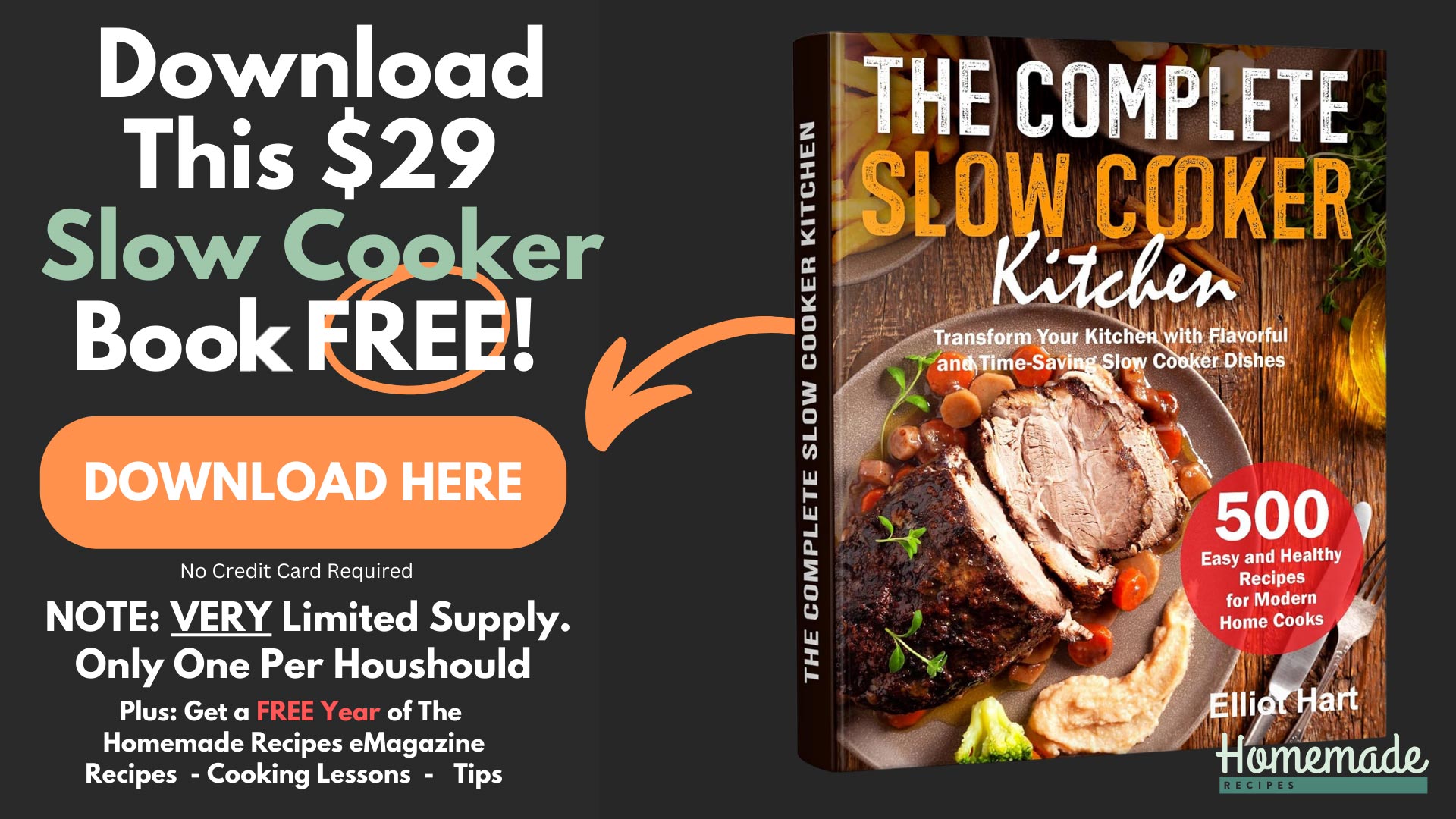
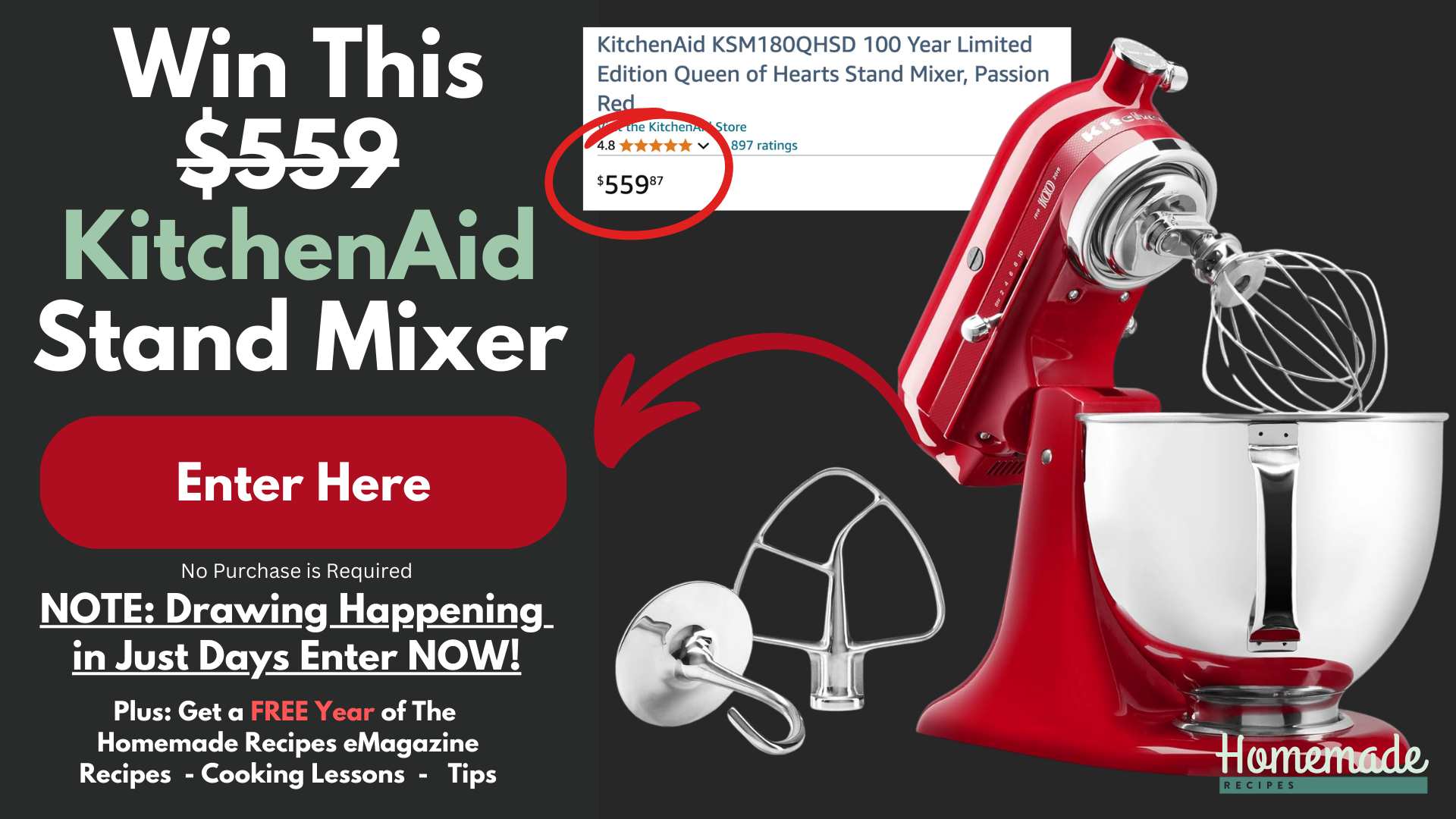
Leave a Reply